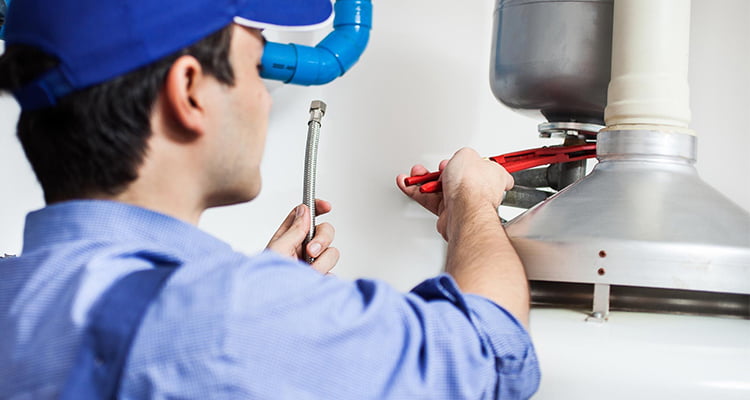
When the comfort of a warm shower suddenly changes to an unexpected icy chill, it’s a clear sign that your hot water tank may be on the brink of failure. A reliable source of hot water is crucial for daily comfort and hygiene.
But what if your hot water heater suddenly starts acting up? That’s where professional HVAC companies come into play. They specialize in hot water tank replacement and have the expertise to guide you through the process.
In this blog, we’ll discuss a few key things you should know if you want to replace your hot water tank.
Signs That Your Hot Water Tank Needs Replacement
Age
Just like anything else, hot water tanks have a lifespan. Typically, they last anywhere from 8 to 12 years, depending on factors such as usage, maintenance, and water quality. If your tank is nearing or has surpassed this age range, it’s wise to start considering a replacement, even if it’s still functioning.
Rust And Corrosion
Inspect the exterior of your tank for any signs of rust or corrosion. These are telltale signs that your tank is deteriorating and may soon develop leaks. Rusty water coming from your hot water tap is also a clear indication that it’s time for a hot water tank replacement.
Strange Noises
Is your hot water tank making banging, popping, or rumbling noises? These sounds could be a sign of sediment buildup inside the tank, which reduces its efficiency and can lead to premature failure.
Leaks
Visible leaks around your hot water tank are an obvious red flag. Even minor leaks can quickly escalate into major water damage issues if left unaddressed. This can happen to both gas and electric water heaters.
If you notice any pooling water or dampness around your tank, it’s time to take action.
Inconsistent Water Temperature
Are you experiencing fluctuations in water temperature? If your hot water is no longer reliably hot or if you’re getting bursts of scalding water followed by cold spells, it could indicate a problem with your tank’s heating element or thermostat.
In this scenario, the only suitable option is to go for a hot water tank replacement.
Types Of Hot Water Tanks
Conventional Tanks
Conventional or storage tank water heaters are the most common type found in Canadian homes. They are mostly gas water heaters that use natural gas to heat water. They consist of an insulated tank where water is heated and stored until needed.
These tanks are available in various sizes to accommodate different household needs.
Tankless Water Heaters
Tankless water heaters, also known as on-demand or instantaneous water heaters, heat water directly as it flows through the unit without the need for a storage tank.
They’re more energy-efficient than conventional tanks since they only heat water when needed, but they may have limitations on simultaneous hot water usage.
Heat Pump Water Heaters
Heat pump water heaters extract heat from the surrounding air and use it to heat water. While they’re highly efficient, they may not be suitable for colder climates or poorly ventilated areas.
Solar Water Heaters
Solar water heaters use solar panels to capture and convert sunlight into heat, which is then transferred to the water stored in a tank. They’re environmentally friendly and cost-effective in the long run but require ample sunlight and space for installation.
Factors To Consider When Choosing A Replacement
Size And Capacity
Consider your household’s hot water usage patterns and select a tank size and capacity that can adequately meet your needs. A larger family will require a larger tank or a higher-capacity tankless unit to ensure a steady supply of hot water.
Energy Efficiency
Opt for a replacement tank that is energy-efficient to help reduce your utility bills and minimize your environmental footprint. Look for tanks with high Energy Factor (EF) ratings and ENERGY STAR certification.
Installation Costs
Factor in the installation costs when budgeting for your replacement. The complexity of water heater installation, the type of tank selected, and any necessary upgrades to your plumbing system can all impact the overall cost.
Longevity And Warranty
Choose a reputable brand with a solid track record for reliability and durability. Check the warranty terms offered by the manufacturer, ensuring you’re protected against defects and premature failure.
Maintenance Requirements
Consider the maintenance requirements of different types of hot water tanks. Tankless units may require periodic flushing to prevent mineral buildup, while conventional tanks may need annual draining and inspection.
The Replacement Process
Once you’ve selected the right replacement hot water tank for your home, it’s time to schedule the installation. Here’s what you can expect during the replacement process:
- Removal Of Old Tank: The old hot water tank will be drained and disconnected from the plumbing system before being removed from your home.
- Installation Of New Tank: The new tank will be positioned in place and connected to your existing plumbing and gas or electrical supply lines.
- Testing And Inspection: The installer will test the new tank to ensure it’s functioning correctly and inspect for any leaks or issues.
- Cleanup And Disposal: Any debris or old equipment will be removed from your home, leaving you with a clean and tidy space.
About Us
Welcome to Pro West Heating & Air Conditioning, your premier destination for top-rated HVAC services in Vancouver and the surrounding areas. Our mission is to provide exceptional HVAC solutions that exceed our customers’ expectations.
Contact us today to schedule a consultation or service appointment. Whether you need a new installation, routine maintenance, or emergency repairs, our team is here to provide the best HVAC solutions for your home or business.